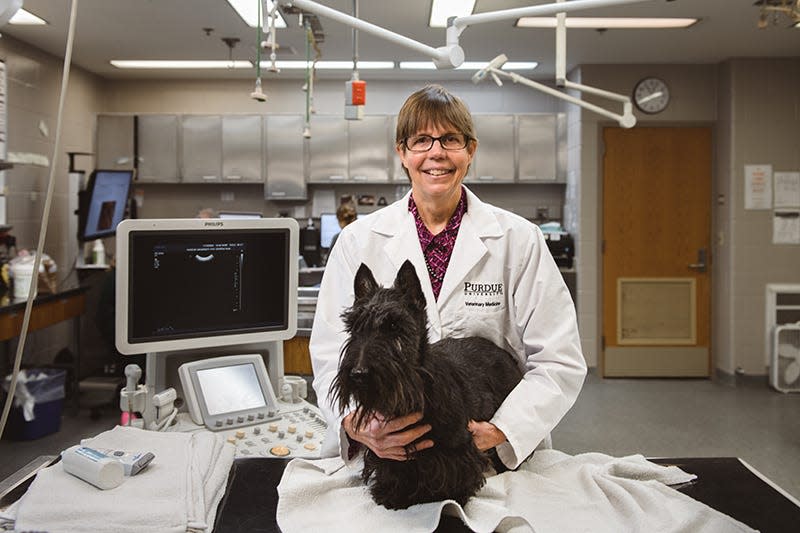Purdue researcher's efforts aimed at early detection of canine cancer
WEST LAFAYETTE, Ind. − A Purdue researcher has been working the last three years on a promising early detection and treatment measure for cancer in dogs.
Deborah Knapp, Purdue Distinguished Professor of Comparative Oncology, has spent the last 30 years of her career studying bladder cancer in dogs.
However, specifically for the past three years, Knapp and her team have studied a group of 120 Scottish terriers, a breed that is 20 times more likely to develop bladder cancer than other dog breeds.

Every six months, the dogs were given urinary tract ultrasound exams and urinalyses. When any suspicions of cancer arose from the tests, Knapp's team performed cystoscopic biopsies.
According to Purdue, of those 120 Scottish terriers, 32 showed to have the early stages of bladder cancer. The screenings by Knapp and her team allowed the cancer to be caught early, before symptoms emerged or the dogs' health/behavior changed.
"Knapp’s team also assessed the accuracy of two types of commercially available urine tests for bladder cancer screening but found that those tests did not accurately predict or identify cancer," the release says.
This early detection allowed the dogs to receive treatment early, and let the team study how cancer and tumors evolve at a molecular level as the cancer progressed.
"The dogs diagnosed with cancer were treated with deracoxib, a nonsteroidal anti-inflammatory drug (NSAID) that has antitumor activity in dogs and is typically used to treat bladder cancer in dogs," the release says. "Usually, the drug results in a remission rate of 20% in dogs with the more typically advanced symptomatic bladder cancer. However, with the early detection from Knapp’s team, the drug resulted in a 42% remission rate."
Knapp commented on the importance of early detection, especially when the dogs' behavior has yet to show any symptoms of illness.
“Finding the cancer early in these dogs, who were behaving normally but walking around and brewing cancer in their bladders, meant we were able to treat them earlier in the cancer development process,” Knapp said in the release. “The drugs worked so much better because we started managing the cancer earlier. We expected the remission rate to be better than the ‘usual’ 20%, but we didn’t expect to see quite this dramatic a difference. The drug we used, Deramaxx, is considered a conservative, oral, affordable therapy. And it doubled the remission rate in the dogs, thanks to the early detection.”
As reported in the release, the Scottie-community highly approved of this study and some owners drove hundreds of miles to have their dogs participate in the trial.
“From the veterinary perspective, our study shows that we ought to be screening dogs for bladder cancer,” Knapp said in the release. “This should become more routine for certain dogs in the future. But from the science side, we found so much more than that, especially in comparative genomics. Our study is the first to show that if you can truly find cancer early, and treat it, it makes a huge difference.
"Ours is the first, but we hope this will start a paradigm shift. We are moving toward a more personalized, proactive approach to addressing cancer.”
This article originally appeared on Lafayette Journal & Courier: Purdue researcher's efforts aimed at early detection of canine cancer

